Robert Raymer's Blog, page 25
March 19, 2011
Elizabeth Gilbert: A new way to think about creativity
When I first came across this video by Elizabeth Gilbert, author of Eat, Pray, Love at the TED conference a couple of months ago, I was mesmerized as I listened to her insights into creativity, how to deal with it, and how to put it all into perspective. It also struck a chord. Writers, artists, creative people of all kind, put far too much pressure on themselves to continually come up with something brilliant to prove their genius, and by doing do, often drive themselves if not crazy, then drunk or depressed or even suicidal.
The video is about 20 minutes, but it's packed full of wisdom and humor as you watch her bounce on stage, dealing with the reality of coming to terms with her enormous success of Eat, Pray, Love. As she puts it, everyone thinks she's now "doomed" because her best work is now behind her . . . . I sure hope not because I recently bought her follow up memoir, Committed, A Love Story, about how US Immigration kicked out Felipe, the Brazilian she fell in love with in Bali, and how they both wrestled with this decision to get married after they swore their eternal love for each other, yet also swore not to get married.
I like how she takes on these big elusive issues. I believe you'll enjoy her take on creativity in the above video. I'm also reminded that, genius aside, you still have to show up every day to do your job, and yes it'll still be a struggle, but you're not alone, and if you're lucky, you'll have some mystical help along the way… [image error]
Published on March 19, 2011 06:37
March 14, 2011
Four Films: A Writer as a Film Extra, while based in Penang, Malaysia
 Group shot from Paradise Road, Cannon Square, Penang. Glenn Close and Juianna Margulies from ER are kneeling at center.
Group shot from Paradise Road, Cannon Square, Penang. Glenn Close and Juianna Margulies from ER are kneeling at center.  As a writer based in Penang, Malaysia, I found myself as a film extra in four films, which I wrote about in Tropical Affairs: Episodes from an Expat's Life in Malaysia and posted excerpts in late 2009. Three of these are in my all time top five blog posts and one is in the top seven for this month, thanks to a cool group photo. Some even consider this the most interesting part of the book because it takes you behind the scenes of four acclaimed films with A-list directors such as Bruce Beresford, Andy Tennant and John Boorman, and Oscar-award winning/nominated actresses, including Jodie Foster, Francis McDormand, Cate Blanchett, and Catherine Deneuve. One film, even won an Oscar for best foreign language film, Indochine. Indochine, a small closed set for the Christmas party scene, was my introduction to life on the movie set, followed by larger scene later, and then the films
Beyond Rangoon
,
Paradise Road
and Anna and the King, a truly magnificent ride. Here is a collage of photographs of writer as film extra, and some of these were even snapped by a couple of stars themselves.
As a writer based in Penang, Malaysia, I found myself as a film extra in four films, which I wrote about in Tropical Affairs: Episodes from an Expat's Life in Malaysia and posted excerpts in late 2009. Three of these are in my all time top five blog posts and one is in the top seven for this month, thanks to a cool group photo. Some even consider this the most interesting part of the book because it takes you behind the scenes of four acclaimed films with A-list directors such as Bruce Beresford, Andy Tennant and John Boorman, and Oscar-award winning/nominated actresses, including Jodie Foster, Francis McDormand, Cate Blanchett, and Catherine Deneuve. One film, even won an Oscar for best foreign language film, Indochine. Indochine, a small closed set for the Christmas party scene, was my introduction to life on the movie set, followed by larger scene later, and then the films
Beyond Rangoon
,
Paradise Road
and Anna and the King, a truly magnificent ride. Here is a collage of photographs of writer as film extra, and some of these were even snapped by a couple of stars themselves.
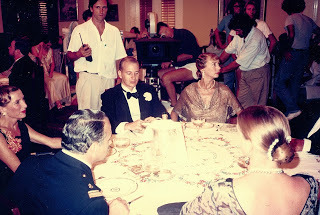 Robert Raymer at center on the set of Indochine
Robert Raymer at center on the set of Indochine
 Indochine: Catherine Deneuve rehearsing her dance with Linh Dan Pham
Indochine: Catherine Deneuve rehearsing her dance with Linh Dan Pham 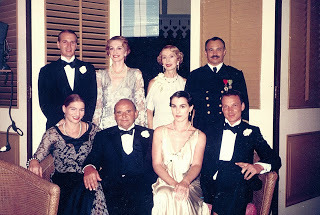 The IndochineTango Dancers. standing Robert Raymer, Joelle St-Arnoult, Angela and Lee Clark; seated Anni Nordmann, Andre Cluzaud, Laurence, Seibert Kubsch
The IndochineTango Dancers. standing Robert Raymer, Joelle St-Arnoult, Angela and Lee Clark; seated Anni Nordmann, Andre Cluzaud, Laurence, Seibert Kubsch
 Indochine, Joelle St-Arnoult and I danced the tango together
Indochine, Joelle St-Arnoult and I danced the tango together
 Beyond Rangoon: Joelle St-Arnoult and Robert Raymer.
Beyond Rangoon: Joelle St-Arnoult and Robert Raymer. 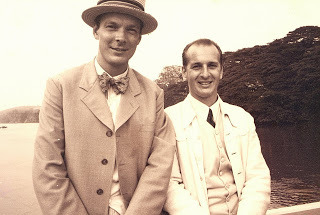 Indochine: Linh Dan Pham took this black and white photo of Siggi and me.
Indochine: Linh Dan Pham took this black and white photo of Siggi and me.
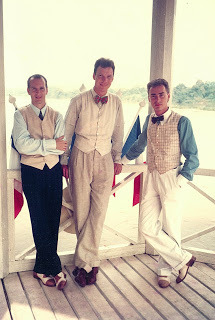 On the set of racing boat scene in Indochine. Robert Raymer at left with Siggi
On the set of racing boat scene in Indochine. Robert Raymer at left with Siggiand friend on the footbridge that the French built at Parit, Perak.
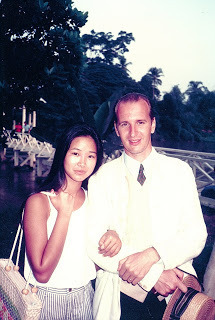 Indochine: Robert Raymer with actress Linh Dan Pham
Indochine: Robert Raymer with actress Linh Dan Pham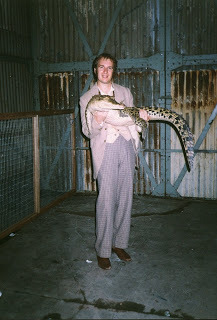 Anna and the King: Robert Raymer and the crocodile
Anna and the King: Robert Raymer and the crocodile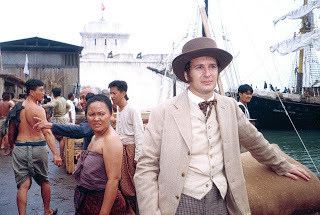 Robert Raymer,with fake sideburns, on the set of Anna and the King
Robert Raymer,with fake sideburns, on the set of Anna and the King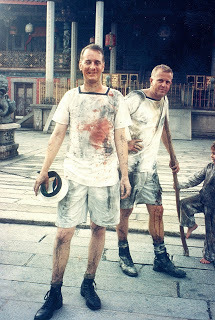 Paradise Road, Robert Raymer at left
Paradise Road, Robert Raymer at left [image error]
Published on March 14, 2011 02:13
March 13, 2011
Anthony Brooke, the last Heir to the Throne of Sarawak, Dies
Anthony Brooke was an heir to the Throne of Sarawak, the last link to the powers of the last White Rajah of Borneo. So much has been written about the 100 year dynasty of the Brookes rule in Sarawak, but yet there was always that confusion after the war, the wrangling of the British government, the increasing lack of interest of the third Raja, Vyner, and the intrigues surrounding Anthony Brooke, who as heir to the throne, kept falling in and out of favor, and how the rights to Sarawakians was rather underhandedly usurped in favor of the British. Here's the link to the article in The Telegraph with a brief overview of Sarawak's rather romantic history and the demise of Anthony Brooke, but it barely scratches the surface.
Someday I plan to write more about Sarawak; already I have a couple of novel ideas, but for now my work is still Penang based, rewriting novels that I started before moving to Sarawak. So far, I've only written one feature article about Sarawak, mostly about Kuching, for a US publication, and a couple of blog posts about my walks with Jason, one set in Penang, and the other three in Quop or 7-Mile. Maybe I should do more of this, pick up where I left off.
Sarawak such a huge story to be told and countless stories within each story, but the more recent ones, about the ongoing logging battles over land rights, is not a pleasant one and does not bode well for the future of Sarawakians living in the interior. [image error]
Someday I plan to write more about Sarawak; already I have a couple of novel ideas, but for now my work is still Penang based, rewriting novels that I started before moving to Sarawak. So far, I've only written one feature article about Sarawak, mostly about Kuching, for a US publication, and a couple of blog posts about my walks with Jason, one set in Penang, and the other three in Quop or 7-Mile. Maybe I should do more of this, pick up where I left off.
Sarawak such a huge story to be told and countless stories within each story, but the more recent ones, about the ongoing logging battles over land rights, is not a pleasant one and does not bode well for the future of Sarawakians living in the interior. [image error]
Published on March 13, 2011 07:13
March 10, 2011
Dropping the Ball and Picking it up again and Running with it!
At times, we're all guilty of dropping the ball, whereby we let an opportunity pass us by, stop working on an important project, or make an error that needed to be fixed. The expression, as far as I know, comes from American football, whereby if you drop the football when the ball is in play, the opposing team can pick it up and run with it. Not good, especially if they score a touchdown. Either way, you look bad or unreliable, and in business relationships, including writing projects, people may not want to work with you again. It's like, I gave you this project and you dropped the ball. You didn't follow through or you did such a poor job we can't use it!
 If you do drop the ball for whatever reasons, you can also pick it up and run with it! When it does happen, sure it can be humbling. Yet I've always been rewarded. (At the very least, I feel good about myself for not giving up.) My most recent book,
Spirit of Malaysia
is a good example. When I got the assignment, I thought no problem, but while doing it, I found myself feeling a bit overwhelmed. I had stack of books on Malaysia and all this information, and I found myself stalled on the project. I couldn't seem to move forward. But finally, as I neared the deadline, I picked up that ball with a vengeance, and instead of focusing on the whole book, I systematically worked my through the project chapter by chapter, section by section, and before I knew it, I was done. Now the book is out and I feel proud. My name is on that book, not someone else's.
If you do drop the ball for whatever reasons, you can also pick it up and run with it! When it does happen, sure it can be humbling. Yet I've always been rewarded. (At the very least, I feel good about myself for not giving up.) My most recent book,
Spirit of Malaysia
is a good example. When I got the assignment, I thought no problem, but while doing it, I found myself feeling a bit overwhelmed. I had stack of books on Malaysia and all this information, and I found myself stalled on the project. I couldn't seem to move forward. But finally, as I neared the deadline, I picked up that ball with a vengeance, and instead of focusing on the whole book, I systematically worked my through the project chapter by chapter, section by section, and before I knew it, I was done. Now the book is out and I feel proud. My name is on that book, not someone else's.
 When Lovers and Strangers (Heinemann 1993) first went out of print after Heinemann got bought out a couple of times and the Writing in Asia series (and all of their fiction) was dropped, I kept thinking, I should get this published by someone else. But the idea languished until 2005 when a professor at USM approached me about teaching Lovers and Strangers. I picked up that ball and ran with it. I not only approached another publisher, I hired my own editor to rip the already published stories apart so I could take them to a higher level and revisited them all. Soon I had a new book Lovers and Strangers Revisited (first with Silverfish, 2005, and then with MPH, 2008) and now this new French edition is coming out later this year.
When Lovers and Strangers (Heinemann 1993) first went out of print after Heinemann got bought out a couple of times and the Writing in Asia series (and all of their fiction) was dropped, I kept thinking, I should get this published by someone else. But the idea languished until 2005 when a professor at USM approached me about teaching Lovers and Strangers. I picked up that ball and ran with it. I not only approached another publisher, I hired my own editor to rip the already published stories apart so I could take them to a higher level and revisited them all. Soon I had a new book Lovers and Strangers Revisited (first with Silverfish, 2005, and then with MPH, 2008) and now this new French edition is coming out later this year.
 Then there is Tropical Affairs. For years (decade and a half) I had the idea to collect my articles and compile them into a book. I even had them separated into different sections, but then after I began teaching writing at USM, I focused my limited writing time on writing novels. But I picked up the ball again and pitched the idea to MPH and began rewriting the articles and turned it into a new book.
Then there is Tropical Affairs. For years (decade and a half) I had the idea to collect my articles and compile them into a book. I even had them separated into different sections, but then after I began teaching writing at USM, I focused my limited writing time on writing novels. But I picked up the ball again and pitched the idea to MPH and began rewriting the articles and turned it into a new book.
As you can see, there are usually rewards when you pick up that dropped ball. At the very least, you feel good about yourself because, although you fumbled, and it does happen, you did pick it up again and even ran with it for extra yardage.
Sometimes it's not entirely your own fault. Six years passed by when I last worked on The Boy Who Shot Santa, a novel set in the US. It all began when we had a baby, then we moved to Sarawak, and then we had another baby. . . . Finally I got back to that old manuscript, and revamped and retitled it, and now it has advanced to Round Two of Amazon Breakthrough Novel Award. Will it go any further? Even if it doesn't, I've been submitting it to some agents. Sooner or later, one is going to say yes.
If not, well I got this other novel set in Penang, The Expatriate's Choice. For the same reasons as above, the project got put on hold. But then I picked it up again, and I'm in the process of rewriting it and entering it in the upcoming Faulkner-Wisdom novel contest. Will there be an award waiting for me at the end of the rainbow? I won't know until I arrive there, but so far the view is rather colorful and I'm enjoying the journey, and it is taking me a step closer to one of my goals, to produce more books.
Ideally, we should pick up every single dropped ball. But sometimes we may have bitten off more than we can chew when a project involves a lot more time and resources than we initially thought. Be honest with yourself. If you commit to something, you should complete the task. If not, pass it back or hand it to someone else who would like to take up the challenge. Just don't drop the ball, walk away, and pretend that it wasn't you who dropped it. Also, if you do got any balls that you did drop recently, it could still be lying at your feet just waiting for you to pick it up again and run with it. It's sort of like falling off a bicycle or a horse. Yeah, it hurts (pride especially). But you can still get back on that bicycle/horse and ride off into the sunset. -Robert Raymer, Borneo Expat Writer
 If you do drop the ball for whatever reasons, you can also pick it up and run with it! When it does happen, sure it can be humbling. Yet I've always been rewarded. (At the very least, I feel good about myself for not giving up.) My most recent book,
Spirit of Malaysia
is a good example. When I got the assignment, I thought no problem, but while doing it, I found myself feeling a bit overwhelmed. I had stack of books on Malaysia and all this information, and I found myself stalled on the project. I couldn't seem to move forward. But finally, as I neared the deadline, I picked up that ball with a vengeance, and instead of focusing on the whole book, I systematically worked my through the project chapter by chapter, section by section, and before I knew it, I was done. Now the book is out and I feel proud. My name is on that book, not someone else's.
If you do drop the ball for whatever reasons, you can also pick it up and run with it! When it does happen, sure it can be humbling. Yet I've always been rewarded. (At the very least, I feel good about myself for not giving up.) My most recent book,
Spirit of Malaysia
is a good example. When I got the assignment, I thought no problem, but while doing it, I found myself feeling a bit overwhelmed. I had stack of books on Malaysia and all this information, and I found myself stalled on the project. I couldn't seem to move forward. But finally, as I neared the deadline, I picked up that ball with a vengeance, and instead of focusing on the whole book, I systematically worked my through the project chapter by chapter, section by section, and before I knew it, I was done. Now the book is out and I feel proud. My name is on that book, not someone else's. When Lovers and Strangers (Heinemann 1993) first went out of print after Heinemann got bought out a couple of times and the Writing in Asia series (and all of their fiction) was dropped, I kept thinking, I should get this published by someone else. But the idea languished until 2005 when a professor at USM approached me about teaching Lovers and Strangers. I picked up that ball and ran with it. I not only approached another publisher, I hired my own editor to rip the already published stories apart so I could take them to a higher level and revisited them all. Soon I had a new book Lovers and Strangers Revisited (first with Silverfish, 2005, and then with MPH, 2008) and now this new French edition is coming out later this year.
When Lovers and Strangers (Heinemann 1993) first went out of print after Heinemann got bought out a couple of times and the Writing in Asia series (and all of their fiction) was dropped, I kept thinking, I should get this published by someone else. But the idea languished until 2005 when a professor at USM approached me about teaching Lovers and Strangers. I picked up that ball and ran with it. I not only approached another publisher, I hired my own editor to rip the already published stories apart so I could take them to a higher level and revisited them all. Soon I had a new book Lovers and Strangers Revisited (first with Silverfish, 2005, and then with MPH, 2008) and now this new French edition is coming out later this year. Then there is Tropical Affairs. For years (decade and a half) I had the idea to collect my articles and compile them into a book. I even had them separated into different sections, but then after I began teaching writing at USM, I focused my limited writing time on writing novels. But I picked up the ball again and pitched the idea to MPH and began rewriting the articles and turned it into a new book.
Then there is Tropical Affairs. For years (decade and a half) I had the idea to collect my articles and compile them into a book. I even had them separated into different sections, but then after I began teaching writing at USM, I focused my limited writing time on writing novels. But I picked up the ball again and pitched the idea to MPH and began rewriting the articles and turned it into a new book.As you can see, there are usually rewards when you pick up that dropped ball. At the very least, you feel good about yourself because, although you fumbled, and it does happen, you did pick it up again and even ran with it for extra yardage.
Sometimes it's not entirely your own fault. Six years passed by when I last worked on The Boy Who Shot Santa, a novel set in the US. It all began when we had a baby, then we moved to Sarawak, and then we had another baby. . . . Finally I got back to that old manuscript, and revamped and retitled it, and now it has advanced to Round Two of Amazon Breakthrough Novel Award. Will it go any further? Even if it doesn't, I've been submitting it to some agents. Sooner or later, one is going to say yes.
If not, well I got this other novel set in Penang, The Expatriate's Choice. For the same reasons as above, the project got put on hold. But then I picked it up again, and I'm in the process of rewriting it and entering it in the upcoming Faulkner-Wisdom novel contest. Will there be an award waiting for me at the end of the rainbow? I won't know until I arrive there, but so far the view is rather colorful and I'm enjoying the journey, and it is taking me a step closer to one of my goals, to produce more books.
Ideally, we should pick up every single dropped ball. But sometimes we may have bitten off more than we can chew when a project involves a lot more time and resources than we initially thought. Be honest with yourself. If you commit to something, you should complete the task. If not, pass it back or hand it to someone else who would like to take up the challenge. Just don't drop the ball, walk away, and pretend that it wasn't you who dropped it. Also, if you do got any balls that you did drop recently, it could still be lying at your feet just waiting for you to pick it up again and run with it. It's sort of like falling off a bicycle or a horse. Yeah, it hurts (pride especially). But you can still get back on that bicycle/horse and ride off into the sunset. -Robert Raymer, Borneo Expat Writer
Published on March 10, 2011 19:52
Dropping the Ball and Picking it up Again
At times, we're all guilty of dropping the ball, whereby we let an opportunity pass us by, stop working on an important project, or make a major error, thus screwing it up. The expression, as far as I know, comes from American football, whereby if you drop the football when the ball is in play, the opposing team can pick it up and run with it. Not good, especially if they score a touchdown. Either way, you look bad or unreliable, and in business relationships including writing projects, people may not want to work with you again. It's like, I gave you this project and you dropped the ball. You didn't follow through or you did such a poor job we can't use it!
 Dropping the ball. Not good. But you can also pick up that dropped ball and run with it! I've experienced this first hand several times in the last few years. Humbling, but when I worked up the courage to pick it up and try again, I've always been rewarded. (At the very least, I feel good about myself for not giving up.) My most recent book,
Spirit of Malaysia
is a good example. When I got the assignment, I thought no problem, but while doing it, I found myself feeling a bit overwhelmed. I had stack of books on Malaysia and all this information, and I found myself fighting it for all the wrong reasons. I was also distracted by other projects, and a bit burned over from rewriting three novels back to back to meet some deadlines. So in May last year, I dropped the ball. In June, after admitting defeat, and having a little pep talk with the editor, who thankfully still had confidence in my skills, gave me a second chance. So I picked up that ball with a vengeance, and instead of focusing on the whole book, I systematically worked my through the project chapter by chapter, section by section, and before I knew it, I was done. Now the book is out and I feel proud. My name is on that book, not someone else's.
Dropping the ball. Not good. But you can also pick up that dropped ball and run with it! I've experienced this first hand several times in the last few years. Humbling, but when I worked up the courage to pick it up and try again, I've always been rewarded. (At the very least, I feel good about myself for not giving up.) My most recent book,
Spirit of Malaysia
is a good example. When I got the assignment, I thought no problem, but while doing it, I found myself feeling a bit overwhelmed. I had stack of books on Malaysia and all this information, and I found myself fighting it for all the wrong reasons. I was also distracted by other projects, and a bit burned over from rewriting three novels back to back to meet some deadlines. So in May last year, I dropped the ball. In June, after admitting defeat, and having a little pep talk with the editor, who thankfully still had confidence in my skills, gave me a second chance. So I picked up that ball with a vengeance, and instead of focusing on the whole book, I systematically worked my through the project chapter by chapter, section by section, and before I knew it, I was done. Now the book is out and I feel proud. My name is on that book, not someone else's.
 When Lovers and Strangers (Heinemann 1993) first went out of print after Heinemann got bought out a couple of times and the Writing in Asia series (and all of their fiction) was dropped, I kept thinking, I should get this published by someone else. I dropped the ball on that thought. I did nothing until 2005 when a professor at USM approached me about teaching Lovers and Strangers. I picked up that ball and ran with a vengeance. I not only approached another publisher, I hired my own editor to rip the stories apart so I can take them to a higher level and revisited them all. I soon had a new book Lovers and Strangers Revisited (first with Silverfish, 2005, and then with MPH, 2008) and now this new French edition coming out later this year.
When Lovers and Strangers (Heinemann 1993) first went out of print after Heinemann got bought out a couple of times and the Writing in Asia series (and all of their fiction) was dropped, I kept thinking, I should get this published by someone else. I dropped the ball on that thought. I did nothing until 2005 when a professor at USM approached me about teaching Lovers and Strangers. I picked up that ball and ran with a vengeance. I not only approached another publisher, I hired my own editor to rip the stories apart so I can take them to a higher level and revisited them all. I soon had a new book Lovers and Strangers Revisited (first with Silverfish, 2005, and then with MPH, 2008) and now this new French edition coming out later this year.
 Then there is Tropical Affairs. For years (decade and a half) I had the idea to collect my articles and compile them into a book. I even had them separated into different sections, but then I dropped the ball on that after I began teaching writing at USM and instead focused my limited writing time on writing novels. But I picked up the ball and pitched the idea to MPH and began rewriting the articles and turned it into a new book.
Then there is Tropical Affairs. For years (decade and a half) I had the idea to collect my articles and compile them into a book. I even had them separated into different sections, but then I dropped the ball on that after I began teaching writing at USM and instead focused my limited writing time on writing novels. But I picked up the ball and pitched the idea to MPH and began rewriting the articles and turned it into a new book.
As you can see, there are usually rewards when you pick up that dropped ball. At the very least, you feel good about yourself because, although you fumbled the ball, you did pick it up again and even ran with it for extra yardage.
Sometimes it's not entirely your own fault that you dropped the ball. Six years passed by when I last worked on The Boy Who Shot Santa, a novel set in the US. It all began when we had a baby, then we moved to Sarawak, and then we had another baby. . . . Finally I got back to that old manuscript, and revamped and retitled it, and now it has advanced to Round Two of Amazon Breakthrough Novel Award. Will it go any further? Even if it doesn't, I've been submitting it to some agents. Sooner or later, one is going to say yes.
If not, well I got this other novel set in Penang, The Expatriate's Choice. That ball got dropped for five years for the above same reasons. But then I picked it up again, and I'm in the process of rewriting it and entering it in the upcoming Faulkner-Wisdom novel contest. Will there be an award waiting for me at the end of the rainbow? I won't know until I arrive there, but so far the view is rather colorful and I'm enjoying the journey, and it is taking me a step closer to one of my goals.
If only we can pick up every single ball that we drop. Ideally, we should. But sometimes we do bite off more than we can chew when a project involves a lot more time and resources than we initially thought. Be honest with yourself. If you commit to something, you should complete the task. If not, pass it back or hand it to someone else who would like to take up the challenge. Just don't drop the ball, walk away, and pretend that it wasn't you who dropped it. Also, if you got any balls that you did drop recently, it could still be lying at your feet just waiting for you to pick it up again. It's sort of like falling off a bicycle or a horse. Yeah, it hurts (pride especially). But you can still get back on that bicycle/horse and ride off into the sunset. -Robert Raymer, Borneo Expat Writer
 Dropping the ball. Not good. But you can also pick up that dropped ball and run with it! I've experienced this first hand several times in the last few years. Humbling, but when I worked up the courage to pick it up and try again, I've always been rewarded. (At the very least, I feel good about myself for not giving up.) My most recent book,
Spirit of Malaysia
is a good example. When I got the assignment, I thought no problem, but while doing it, I found myself feeling a bit overwhelmed. I had stack of books on Malaysia and all this information, and I found myself fighting it for all the wrong reasons. I was also distracted by other projects, and a bit burned over from rewriting three novels back to back to meet some deadlines. So in May last year, I dropped the ball. In June, after admitting defeat, and having a little pep talk with the editor, who thankfully still had confidence in my skills, gave me a second chance. So I picked up that ball with a vengeance, and instead of focusing on the whole book, I systematically worked my through the project chapter by chapter, section by section, and before I knew it, I was done. Now the book is out and I feel proud. My name is on that book, not someone else's.
Dropping the ball. Not good. But you can also pick up that dropped ball and run with it! I've experienced this first hand several times in the last few years. Humbling, but when I worked up the courage to pick it up and try again, I've always been rewarded. (At the very least, I feel good about myself for not giving up.) My most recent book,
Spirit of Malaysia
is a good example. When I got the assignment, I thought no problem, but while doing it, I found myself feeling a bit overwhelmed. I had stack of books on Malaysia and all this information, and I found myself fighting it for all the wrong reasons. I was also distracted by other projects, and a bit burned over from rewriting three novels back to back to meet some deadlines. So in May last year, I dropped the ball. In June, after admitting defeat, and having a little pep talk with the editor, who thankfully still had confidence in my skills, gave me a second chance. So I picked up that ball with a vengeance, and instead of focusing on the whole book, I systematically worked my through the project chapter by chapter, section by section, and before I knew it, I was done. Now the book is out and I feel proud. My name is on that book, not someone else's. When Lovers and Strangers (Heinemann 1993) first went out of print after Heinemann got bought out a couple of times and the Writing in Asia series (and all of their fiction) was dropped, I kept thinking, I should get this published by someone else. I dropped the ball on that thought. I did nothing until 2005 when a professor at USM approached me about teaching Lovers and Strangers. I picked up that ball and ran with a vengeance. I not only approached another publisher, I hired my own editor to rip the stories apart so I can take them to a higher level and revisited them all. I soon had a new book Lovers and Strangers Revisited (first with Silverfish, 2005, and then with MPH, 2008) and now this new French edition coming out later this year.
When Lovers and Strangers (Heinemann 1993) first went out of print after Heinemann got bought out a couple of times and the Writing in Asia series (and all of their fiction) was dropped, I kept thinking, I should get this published by someone else. I dropped the ball on that thought. I did nothing until 2005 when a professor at USM approached me about teaching Lovers and Strangers. I picked up that ball and ran with a vengeance. I not only approached another publisher, I hired my own editor to rip the stories apart so I can take them to a higher level and revisited them all. I soon had a new book Lovers and Strangers Revisited (first with Silverfish, 2005, and then with MPH, 2008) and now this new French edition coming out later this year. Then there is Tropical Affairs. For years (decade and a half) I had the idea to collect my articles and compile them into a book. I even had them separated into different sections, but then I dropped the ball on that after I began teaching writing at USM and instead focused my limited writing time on writing novels. But I picked up the ball and pitched the idea to MPH and began rewriting the articles and turned it into a new book.
Then there is Tropical Affairs. For years (decade and a half) I had the idea to collect my articles and compile them into a book. I even had them separated into different sections, but then I dropped the ball on that after I began teaching writing at USM and instead focused my limited writing time on writing novels. But I picked up the ball and pitched the idea to MPH and began rewriting the articles and turned it into a new book.As you can see, there are usually rewards when you pick up that dropped ball. At the very least, you feel good about yourself because, although you fumbled the ball, you did pick it up again and even ran with it for extra yardage.
Sometimes it's not entirely your own fault that you dropped the ball. Six years passed by when I last worked on The Boy Who Shot Santa, a novel set in the US. It all began when we had a baby, then we moved to Sarawak, and then we had another baby. . . . Finally I got back to that old manuscript, and revamped and retitled it, and now it has advanced to Round Two of Amazon Breakthrough Novel Award. Will it go any further? Even if it doesn't, I've been submitting it to some agents. Sooner or later, one is going to say yes.
If not, well I got this other novel set in Penang, The Expatriate's Choice. That ball got dropped for five years for the above same reasons. But then I picked it up again, and I'm in the process of rewriting it and entering it in the upcoming Faulkner-Wisdom novel contest. Will there be an award waiting for me at the end of the rainbow? I won't know until I arrive there, but so far the view is rather colorful and I'm enjoying the journey, and it is taking me a step closer to one of my goals.
If only we can pick up every single ball that we drop. Ideally, we should. But sometimes we do bite off more than we can chew when a project involves a lot more time and resources than we initially thought. Be honest with yourself. If you commit to something, you should complete the task. If not, pass it back or hand it to someone else who would like to take up the challenge. Just don't drop the ball, walk away, and pretend that it wasn't you who dropped it. Also, if you got any balls that you did drop recently, it could still be lying at your feet just waiting for you to pick it up again. It's sort of like falling off a bicycle or a horse. Yeah, it hurts (pride especially). But you can still get back on that bicycle/horse and ride off into the sunset. -Robert Raymer, Borneo Expat Writer
Published on March 10, 2011 19:52
March 9, 2011
First Draft of New French Cover for Lovers and Strangers Revisited
 Draft cover for Three Other Malaysia, a collection of short stories set in Malaysia.Here's a first draft look at the new cover of Trois autres Malaisie (Three Other Malaysia), the French translation of Lovers and Strangers Revisited. This is book two of a new series of short stories set in Southeast Asia by Éditions GOPE. The first book was Trois autres Thaïlande by Etienne Rosse. For the book, I went through all of the stories again, revising them before passing them to the French translator Jerome Bouchaud, author of the guidebook on Malaysia Malaisie - Modernité et Traditions en Asie du Sud-Est.
Draft cover for Three Other Malaysia, a collection of short stories set in Malaysia.Here's a first draft look at the new cover of Trois autres Malaisie (Three Other Malaysia), the French translation of Lovers and Strangers Revisited. This is book two of a new series of short stories set in Southeast Asia by Éditions GOPE. The first book was Trois autres Thaïlande by Etienne Rosse. For the book, I went through all of the stories again, revising them before passing them to the French translator Jerome Bouchaud, author of the guidebook on Malaysia Malaisie - Modernité et Traditions en Asie du Sud-Est.
 Here's the full cover for Lovers and Strangers Revisited I was glad they removed that photo, which took away from the cover more than it added anything to it! Looking forward to seeing the book in French. Already got two requests for it in Kuching, one by a French woman who loved LSR and another by a reporter who reviewed the Silverfish version of LSR in the Borneo Post nearly four years ago and is now studying French!
Here's the full cover for Lovers and Strangers Revisited I was glad they removed that photo, which took away from the cover more than it added anything to it! Looking forward to seeing the book in French. Already got two requests for it in Kuching, one by a French woman who loved LSR and another by a reporter who reviewed the Silverfish version of LSR in the Borneo Post nearly four years ago and is now studying French!
Published on March 09, 2011 15:33
March 8, 2011
Some Tropical Island Novelists -- Not a Bad Path to Follow
Recently I blogged about two American writers in Borneo and that got me thinking about other writers who either lived on islands or wrote about them, which reminded me of a book that I picked up in Hawaii four years ago after attending the Maui Writers Conference. Since I had been writing on Penang for twenty-one years and was in the process of moving to my second island, Borneo, the heavily discounted book seemed to be speaking to me, Mad About Islands, Novelists of a Vanished Pacific by A Grove Day.
On the back cover was a photo of the very man who lit up my imagination to go off to some tropical island and be a writer, Norman Hall, after I read his autobiography. He along with Charles Nordhoff set off for Tahiti and they found a story that had been waiting for them to write for 140 years, The Mutiny on the Bounty. They turned the Bounty story into a trilogy.
Herman Melville, author of Moby Dick, spent three years roving the Pacific Ocean and wrote several novels about islands in the South Seas. Jack London also did some island-hopping as did Mark Twain, who spent some time on Hawaii writing assignments for a newspaper. Later it was reported that he had written a novel set on Hawaii, but either the manuscript got lost or more likely parts got incorporated into another novel.
Somerset Maugham's Moon and Sixpence is patterned on Paul Gauguin's life in Tahiti. His The Trembling of Leaf featured several island stories, the most famous of which is "Rain". He also spent a great deal writing about Southeast Asia, including Malaya and Borneo. Joseph Conrad's Almayer's Folly, is even set on the east coast of Borneo.
James Michener wrote the Tales of the South Pacific, which was turned into the musical, South Pacific. Of course, the most famous book about an island has to be either Daniel Defoe's Robinson Crusoe or Robert Louis Stevenson's Treasure Island. Stevenson is even buried on the island of Samoa.
For me, one of the novels I'm counting on is The Expatriate's Choice, set on Penang, which even involves a treasure. Since an earlier draft has done well in the Faulkner-Wisdom novel contest it gives me hope as I re-enter a revised version of it at the end of this month. For a writer, especially one living on an island half way around the world, hope is not a bad thing to have.
Published on March 08, 2011 06:57
March 5, 2011
Randy Pausch – The Last Lecture, a reminder
I first stumbled upon the video of Randy Pausch's The Last Lecture three years ago on a blog by a Swiss friend that I met in Penang just prior to moving to Sarawak, and I admit, I had tears in my eyes, but I was immensely inspired. Then my wife came across it last year and I watched it again. If you have a spare hour or so and you've never watched this before, by all means do so. If you just don't have the time because your life is so busy, then maybe you need this more than everyone else. If you've already seen it, maybe you need to see it again to put your life back into perspective.
If you are scheduled to give a last lecture, as part of a series, and then you found out that you were going to die so this really was going to be your last lecture, what would you talk about? And who would your last lecture really be for? Your colleagues and students, or your own children? And what would be your underlying message? Randy Pausch talks about achieving your childhood dreams. He talks about brick walls that are placed in your path that stops most people cold. Walls designed to keep everyone out, except you, but you got to find your way around it! That's the bigger message for me.
After seeing the video (or before), check this out for more about Randy Pausch. There are also follow up clips out there that you can easily find by googling his name, and yes, it's been turned into a book. But at some point, do take some time to reflect on your own life, which we should all do now and then, and really put it in perspective. That is what this Last Lecture did for me. Since it's so easy to lose that perspective as we get caught up in all that other stuff that life throws at us, seeing this every couple of years will bring you back to what's really important in your life, achieving your childhood dreams, and maybe even appreciating your life before it's all taken away from you, and it will someday. When that day comes, assuming you get some advance notice, what would you want to share with the world?
If you are scheduled to give a last lecture, as part of a series, and then you found out that you were going to die so this really was going to be your last lecture, what would you talk about? And who would your last lecture really be for? Your colleagues and students, or your own children? And what would be your underlying message? Randy Pausch talks about achieving your childhood dreams. He talks about brick walls that are placed in your path that stops most people cold. Walls designed to keep everyone out, except you, but you got to find your way around it! That's the bigger message for me.
After seeing the video (or before), check this out for more about Randy Pausch. There are also follow up clips out there that you can easily find by googling his name, and yes, it's been turned into a book. But at some point, do take some time to reflect on your own life, which we should all do now and then, and really put it in perspective. That is what this Last Lecture did for me. Since it's so easy to lose that perspective as we get caught up in all that other stuff that life throws at us, seeing this every couple of years will bring you back to what's really important in your life, achieving your childhood dreams, and maybe even appreciating your life before it's all taken away from you, and it will someday. When that day comes, assuming you get some advance notice, what would you want to share with the world?
Published on March 05, 2011 16:48
March 4, 2011
Mindset, Skillset, Get Off Your Ass-set
Angry over missing an important deadline, one of several I've missed or nearly missed, in the last year, I got up at 5:45am this Saturday morning because I not only needed to get some work done, but I also needed to turn some things around—like my working habits, how I spend my time when I'm supposed to be working, and what am I choosing to work on. Am I working on the important stuff that can significantly help my career, or the busy-day-to-day-email-related stuff that crops up and crowds out your day?
I remember Jim Rohn once said, "Some people have a tendency to major in minor stuff." In other words, the important stuff never gets done. They focus their time and energy on doing the wrong things. If you do that day in and day out, that's exactly where you'll end up, with nothing significant to show for your days, weeks, months, years. The time is gone, and spent on what? This is a question I'm now asking myself. I don't want to make excuses to myself or my family over why I missed an important deadline, when the time was there and it got frittered away doing insignificant stuff.
Writing, like in any other entrepreneurial business, it's so easy to get discouraged by the marketplace (agents/book publishers/editors). But is it the marketplace that is the problem or is the problem you? We all have a tendency to blame everyone else when things don't go according to our "master" plans. But should you always blame the economy or other outside factors, or maybe it's just the way you choose to spend your time (or how you present yourself or your work), or the projects you choose to do? Ask yourself what are you thinking about, what are your goals, and what are you actually going to do about it?
So this powerful three minute interview by Jack Canfield, author of The Success Principles and the Chicken Soup for the Soul series with James Malenchak, featured in "Secret Millionaire" a reality show that will be airing in March 2011, struck a chord with me. James three-set framework for success goes way beyond your typical positive and wishful thinking (law of intention, law of attraction) your way to success. You got to do something. In quoting someone else he says, "You actually accomplish more through movement than meditation"
1) Mindset: Need to train your mind to think in a way to get things done to produce fast results. 2) Skillset: Master a skill that can cut your learning curve from 50% to 90%.
3) Get off your Ass-set: Without this third one, you're going nowhere. You actually got to do something. Keep asking yourself what am I doing? Be your own get-it-done gal or guy! Play this video over and over. It's three-minutes. I've played it four times and it's not even 7am in Borneo yet. What a great way to start my weekend. I'm motivated in more ways than one. Positive anger only gets you so far (it got me out of bed), but action can be life transformation. Make it a habit. Don't major in minor stuff. Good luck.
I remember Jim Rohn once said, "Some people have a tendency to major in minor stuff." In other words, the important stuff never gets done. They focus their time and energy on doing the wrong things. If you do that day in and day out, that's exactly where you'll end up, with nothing significant to show for your days, weeks, months, years. The time is gone, and spent on what? This is a question I'm now asking myself. I don't want to make excuses to myself or my family over why I missed an important deadline, when the time was there and it got frittered away doing insignificant stuff.
Writing, like in any other entrepreneurial business, it's so easy to get discouraged by the marketplace (agents/book publishers/editors). But is it the marketplace that is the problem or is the problem you? We all have a tendency to blame everyone else when things don't go according to our "master" plans. But should you always blame the economy or other outside factors, or maybe it's just the way you choose to spend your time (or how you present yourself or your work), or the projects you choose to do? Ask yourself what are you thinking about, what are your goals, and what are you actually going to do about it?
So this powerful three minute interview by Jack Canfield, author of The Success Principles and the Chicken Soup for the Soul series with James Malenchak, featured in "Secret Millionaire" a reality show that will be airing in March 2011, struck a chord with me. James three-set framework for success goes way beyond your typical positive and wishful thinking (law of intention, law of attraction) your way to success. You got to do something. In quoting someone else he says, "You actually accomplish more through movement than meditation"
1) Mindset: Need to train your mind to think in a way to get things done to produce fast results. 2) Skillset: Master a skill that can cut your learning curve from 50% to 90%.
3) Get off your Ass-set: Without this third one, you're going nowhere. You actually got to do something. Keep asking yourself what am I doing? Be your own get-it-done gal or guy! Play this video over and over. It's three-minutes. I've played it four times and it's not even 7am in Borneo yet. What a great way to start my weekend. I'm motivated in more ways than one. Positive anger only gets you so far (it got me out of bed), but action can be life transformation. Make it a habit. Don't major in minor stuff. Good luck.
Published on March 04, 2011 15:44
March 3, 2011
Expatriate Lifestyle - February 2011
Published on March 03, 2011 19:20
Robert Raymer's Blog
- Robert Raymer's profile
- 3 followers
Robert Raymer isn't a Goodreads Author
(yet),
but they
do have a blog,
so here are some recent posts imported from
their feed.


 Not sure why this can't be clicked and enlarged. It works for the one below!
Not sure why this can't be clicked and enlarged. It works for the one below!

